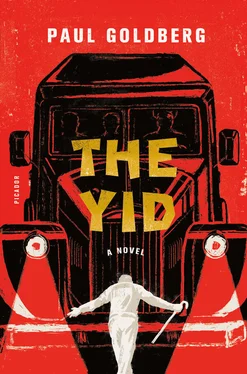If ever a man grasped the meaning of cries of freedom, Komandir Levinson is that man.
Consider one wild charge against the White Army in 1918.
His is a wild “Ura!” with an a-a-a that never ends. “Za mnoy, rebyata!” Follow me, lads.
This being a civil war, the same cries come from both sides of that suicidal charge. Sword drawn, Levinson gallops toward death, his boys behind him. They square off, Komandir Levinson against a White Army major, a man twice his age. They look each other in the eye, aristocrat vs. Yid, count vs. yeshiva reject, komandir vs. komandir .
The major is amused to see dark features in an elongated face, topped off with a great big Jewish beak. Had someone taught him that such things happen, the major might have lived.
But it’s too late to learn. Pierced through the heart, the major falls, and Levinson returns, with a gash across his back, but breathing, the memory of that cry imprinted on his soul.
* * *
Lewis throws the truck into neutral and shifts rapidly to first gear. As the truck lunges forward, the corpses shift in their cage.
At an intersection, the Black Maria rips through a red light.
“Where are we going?” asks Lewis.
“We are going right on the Garden Ring, then straight until I tell you to turn left.”
They are silent for a few minutes.
“That thing you said about your parents; is it true?”
Levinson nods.
“You belong in films, Lewis,” says Levinson as the Black Maria turns right on the Garden Ring. “In films, they have car chases.”
For over twenty years, Levinson has never missed an opportunity to put Lewis’s name and the word “film” in the same sentence. This is not entirely gratuitous, just a tad toxic.
Lewis’s hands clench the wheel a little harder. Not even with three corpses tossing about in the Black Maria will he be provoked into the reminiscences Levinson is so relentlessly trying to trigger.
“Mikhoels is dead,” he says to Levinson. “Can’t you people let go of a grudge?”
* * *
After running another red light, the Black Maria passes one of the just-completed skyscrapers. Just then, an identical light truck pulls out of the building’s tall brown granite archway, blowing its horn and heading toward them.
“What do we do?”
“We stop,” says Levinson.
Two Black Marias come to a stop in the middle of the street, facing in opposite directions.
“Open the window,” says Levinson through his teeth.
“Ey, rebyata, zakurit’ yest’?” asks a young soldier at the wheel. He wants a smoke.
Not having seen Sadykov alive, Lewis doesn’t know whether the man whose blood-soaked uniform he is wearing was a smoker, but as he reaches into the trench coat’s breast pocket, his fingers find a thin cardboard pack.
It’s not a surprise that Sadykov smoked Belomorkanal, a brand named after the Stalin White Sea — Baltic Sea Canal, built by prison labor in the 1930s.
Lewis extends the opened pack to the young man.
“Talk to them,” whispers Levinson in Yiddish, and the command reinforces Lewis’s flagging confidence.
“Kogo vezyote, rebyata?” asks Lewis. Whom do you have there, boys? This happens to be the first question that comes to his mind. He knows that, like a disease, the conversation he has started will have a predictable middle and end.
“ Professor khuyev,” answers the young man. A fucking professor.
The driver takes the pack out of Lewis’s hand and counts out three cigarettes for the crew.
“A Yid?” Levinson prompts in a whisper.
“Zhid?” Lewis translates, taking back the pack of Belomor and slowly sticking it back in his pocket. The play will carry him through. There is no thinking to be done.
“A secret Yid. Wouldn’t know it if you looked at him.”
“The worst kind. Can take you by surprise,” prompts Levinson.
“Maybe he is a half-blood,” suggests Lewis, disregarding Levinson’s cue. He can navigate through such conversations without help. He knows the phrase that will come next:
“Gitler ikh ne dobil,” says the driver. Hitler didn’t finish them off.
This phrase comes up frequently in casual conversations in February 1953, and one can easily learn to anticipate its recurrence.
“A my dobyom!” says Lewis. We’ll finish them off!
“Zeyer gut,” Levinson whispers in Yiddish. Very good.
“A u vas-to kto?” asks the driver. Whom do you have?
“Toyte yidn,” prompts Levinson through his teeth.
“Dead Yids,” Lewis translates into Russian.
“Has it begun?” asks the driver. A broad, joyful smile appears on his face. “Rebyata, nachalos!” he announces to the rest of his crew. It has begun!
In late February 1953, everyone knows that “it” is an antecedent of the final pogrom, one that will forever rid the motherland of the vermin.
“Day khot’ vzglyanut’, nasladitsya,” says the driver. Let me at least take a look and enjoy it.
Lewis jumps out of the cab. He opens the back door, offering a view of three white, unclad corpses.
“Oy zdorovo!” says the driver, his hand involuntarily covering his mouth. This is a delight.
“Did you beat them to death?” asks one of the crew, a young man scarcely older than Sadykov’s Ukrainians.
“Slit the throats,” says Lewis.
As Lewis shuts the back door, the driver pauses for a moment, then bashfully asks the question that, Lewis surmises, must have been on his mind all along: “A sam-to ty kto?” And what are you?
“I am a man,” replies Lewis, getting back into his Black Maria, and for a moment he forgets about his blood-soaked tunic and his cadaverous white face.
“What kind of man?”
“Nastoyashchiy chelovek.” Lewis throws his new friend the entire pack of Belomor. “Sovetskiy!” A real man. A Soviet man.
The soldier catches the pack with his left hand and, after Lewis’s words sink in, slowly raises his right hand in a salute.
Lewis returns the salute, raising his chocolate-colored right hand to his bleached temple.
At 4:39 a.m., Aleksandr Sergeyevich Kogan is sufficiently awake to be surprised when he hears the knock on the door.
Surprised because he was given reason to believe that he had a week to get his affairs in order. Could this be a mistake? Wrong door, perhaps?
Most people don’t get warnings, grace periods. Kogan thought he did. Perhaps their plans have changed. The fact that Kogan is still at large is a surprise to everyone — starting with Kogan.
Exactly one year, three months, and one week ago, Kogan was stripped of his administrative and academic titles — chief of surgery at Pervaya Gradskaya Bol’nitsa, Municipal Hospital Number One, and professor of surgery at First Medical Institute. He continues to practice as an ordinary surgeon, often at the emergency room. Sometimes he makes house calls at the regional clinic. Sometimes he rides with an ambulance, mostly because he wants to, and because no one cares enough to stop him.
After dismissal, Kogan allowed his wardrobe to drift toward simpler things, which hang sack-like on his short, broad frame. A heavy cotton shirt that buttons off-center— tolstovka —replaces his officious coat and tie. The fedora loses its purpose and is replaced by an old military hat. Not his karakul papakha of a colonel (his rank when the war ended), but a basic ushanka , the sort a private might wear.
Being in the streets, easing pain, maybe even saving lives on occasion agrees with Kogan. While taking care of a drunk in the ER, he made a promise to himself that when this political madness ends and his posts are offered back to him with apologies, he will simply reject them and return to the life of a simple doctor. Of course, there are advantages to being a colonel, but sometimes being a private feels cleaner.
Читать дальше












